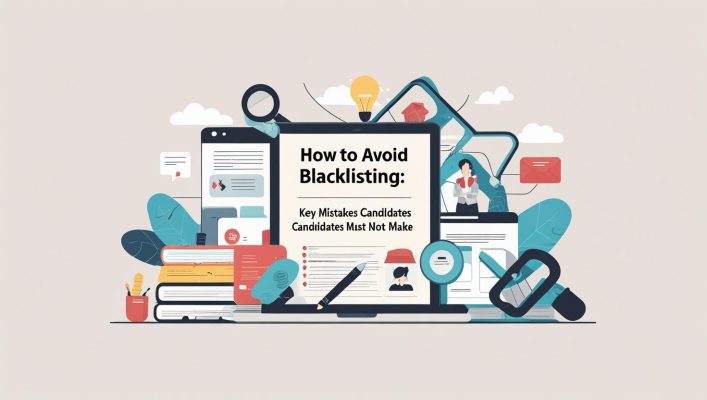
In a job market as competitive as today’s, your reputation travels faster than your resume. With recruiters and hiring managers often relying on word-of-mouth, digital footprints, and previous employer feedback, one wrong move can quietly push your name off the consideration list and worse, onto a mental blacklist.
Blacklisting isn’t always obvious. You might find yourself constantly applying but never hearing back, even when you’re qualified. So, what causes this? And more importantly how do you avoid it?
Let’s break down the most common mistakes candidates make that can lead to being blacklisted, and what you can do to stay in the good books of potential employers.
What Is Candidate Blacklisting?
Think of blacklisting as an unofficial “do not hire” list. It’s when employers, recruiters, or even entire networks decide not to consider someone for future roles, often based on past behavior or red flags.
It might not be published anywhere, but its effects are very real: silence from recruiters, interview cancellations, and job applications that go nowhere. The good news? It’s entirely avoidable.
Mistakes That Can Get You Blacklisted
It might seem small, but failing to follow application directions—such as submitting in the wrong format or missing required documents signals carelessness. Hiring managers deal with dozens, if not hundreds, of applications. If you can’t follow simple steps, how will you handle complex job tasks?
A little exaggeration might feel harmless, but misrepresenting your qualifications, experience, or job titles can backfire quickly. Background checks, reference calls, or even LinkedIn comparisons often reveal the truth. Once your credibility is in question, rebuilding trust with that employer or others is tough.
Leaving on bad terms, ghosting employers during hiring stages, or speaking poorly about past jobs can follow you around. Industries are smaller than you think. A hiring manager at one company might know someone at your last job. If your name brings up red flags in conversation, it could close doors before they open.
Presenting Yourself Professionally: Where It Begins
A Sharp Resume
Your resume should tell a clear, honest story. Instead of listing every job you’ve ever had, focus on relevant achievements and responsibilities. Keep formatting simple and consistent, and avoid fluff. You want your skills and results to stand out, not your font choice.
Tailored Cover Letters
Sending the same letter to every employer is like using a generic greeting card it lacks sincerity. A tailored cover letter that shows you’ve researched the company and understand the role is far more impactful. Mention why you’re a good fit and what you can bring to their team, specifically.
Don’t Underestimate Social Media
Watch What You Share
Your online presence is often an extension of your resume. Hiring managers do check profiles sometimes even before interviews. Avoid ranting, arguing, or oversharing controversial views on public platforms. Stay mindful of how posts, photos, and comments may be perceived by a future employer.
Use Privacy Settings Wisely
It’s okay to have a personal life online. Just be smart about who can see it. Review your privacy settings regularly and make sure only the right audience can access your more casual content.
Nail the Interview, Don’t Derail It
Communicate Clearly
Unclear or vague answers raise questions. Structure your responses using the STAR method (Situation, Task, Action, Result). It helps keep your thoughts organized and makes you sound confident—even if you’re nervous.
Handle Difficult Questions Thoughtfully
When asked about gaps in employment or weaknesses, be honest without over-sharing. Focus on what you learned or how you improved. Employers aren’t looking for perfection; they’re looking for self-awareness and growth.
Choose Your References Carefully
References are more than a formality they can make or break your candidacy. Choose people who know your work ethic, strengths, and character. Former supervisors, mentors, or senior colleagues are ideal.
Also, always give them a heads-up before sharing their name. Let them know what role you’re applying for and what qualities you’d appreciate them highlighting. This helps them prepare and ensures their message aligns with yours.
Stay Informed and In-Demand
Learn the Company Culture
Before applying or interviewing, take time to understand the company’s values and work style. Use their website, social media, or employee reviews. The more aligned you are with their environment, the better your chances—and the less likely you are to accept a job that isn’t the right fit.
Keep Up with Industry Trends
Whether it’s digital tools, customer behavior, or regulations—being informed about your industry shows initiative. Subscribe to newsletters, attend webinars, or take a short course. It not only boosts your skills but gives you something valuable to discuss during interviews.
Building and Keeping Your Reputation
Your reputation is built over time, across platforms and interactions. Here’s how to protect and strengthen it:
Final Thoughts
Avoiding blacklisting isn’t about being perfect it’s about being consistent, professional, and thoughtful in your approach. Every interaction with an employer leaves an impression. Make sure it’s a good one.
By steering clear of the pitfalls outlined above, you’ll not only protect your reputation you’ll become the kind of candidate employers want to pursue.
Job hunting is a journey. The goal isn’t just to land a job it’s to build a career. And that starts with how you show up, both online and off.
+971 4 55 79 865 | +971 5 82 93 3367
info@jobsglobalhr.com
Business Village Building, Block-B, 7th Floor, Office No. 734, Port Saeed Deira, Dubai, United Arab Emirates
Copyright © 2025 Job Global HR Consultancy – All Rights Reserved.
